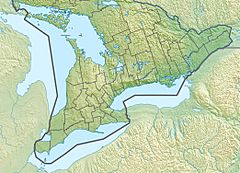Bighead River facts for kids
Quick facts for kids Bighead River |
|
|---|---|
|
Location of the mouth of the Bighead River in southern Ontario
|
|
| Country | Canada |
| Province | Ontario |
| County | Grey |
| Municipalities |
|
| Physical characteristics | |
| Main source | Forest Chatsworth 328 m (1,076 ft) 44°24′56″N 80°50′21″W / 44.41556°N 80.83917°W |
| River mouth | Lake Huron Meaford 176 m (577 ft) 44°36′28″N 80°35′21″W / 44.60778°N 80.58917°W |
| Basin features | |
| River system | Great Lakes Basin |
| Tributaries |
|
The Bighead River is a cool river located in Grey County, which is in southern Ontario, Canada. It starts its journey from the Niagara Escarpment, a long, steep slope of rock. The river flows between the towns of Arnott and Holland Centre. Both of these places are in the township of Chatsworth.
The Bighead River eventually flows into Nottawasaga Bay. This bay is an inlet of Georgian Bay, which is a large part of Lake Huron. The river finally meets Lake Huron at the town of Meaford.
The River's Journey
The Bighead River begins its flow in a forest near Chatsworth. This area is part of the Niagara Escarpment, a really old and important natural feature. The river starts at an elevation of about 328 meters (1,076 feet) above sea level.
As the river travels, it loses elevation, flowing downhill towards Lake Huron. It passes through different landscapes, including forests and farmlands. The river's journey ends when it reaches Meaford, where it empties into Lake Huron. At this point, the river is about 176 meters (577 feet) above sea level.
Where the River Flows
The Bighead River is an important part of the local environment. It flows through a valley that is crossed by the Bruce Trail. The Bruce Trail is a very famous hiking trail in Ontario.
The river's valley is located between two interesting natural areas. One is the Spey River Forest Area. The other is the Walters Falls Conservation Area. These areas help protect the natural beauty and wildlife around the river.
What Feeds the River?
Rivers often get water from smaller streams that flow into them. These smaller streams are called tributaries. The Bighead River has several tributaries that add water to its flow.
Here are some of the streams that join the Bighead River:
- East Minniehill Creek (joins from the right side)
- Minniehill Creek (joins from the right side)
- Rocklyn Creek (joins from the right side)
- Walters Creek (joins from the right side)
These tributaries help keep the Bighead River flowing strong. They collect water from the surrounding land and bring it into the main river.
 | Aurelia Browder |
 | Nannie Helen Burroughs |
 | Michelle Alexander |


